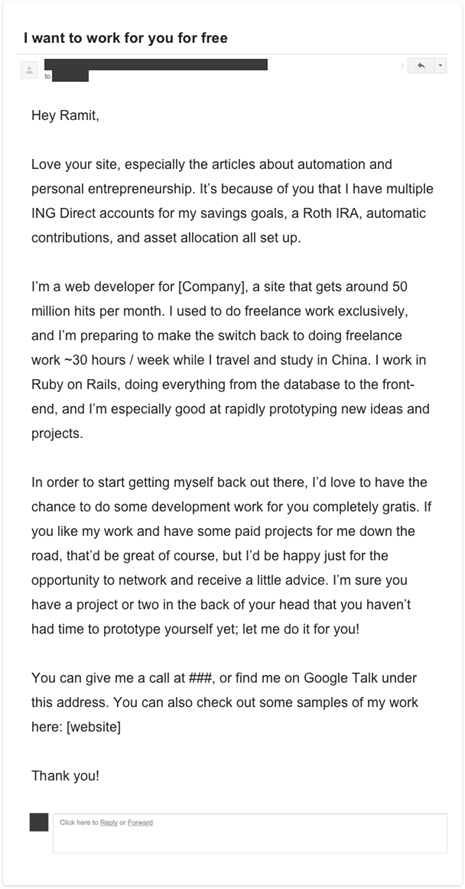
How to Ask for a Favor and Get It (5 easy rules + real examples)
Step 1: Consider how your favor impacts them
When you ask for a favor, you’re essentially doing sales. You’re selling someone else your needs at the cost of their time, energy, and/or money.
And that’s what you’ve got to realize: It’s not all about you. While this favor benefits you in some way, you’re putting this person out in another way. You need to acknowledge that and compensate for it.
Having empathy like this is absolutely necessary for two reasons:
- It lets you talk to the person you’re selling to on their terms. You can relate to them and speak their language. Think about it: How you ask for a favor from your boss is a lot different than how you ask for a favor from your friend.
- It lets you adapt as the “sale” happens. When you care about the other person’s emotions and needs, you can see if what you’re asking from them is too much, or maybe if you’re asking it in a way that makes them feel weird. So stop weirding them out and relate to them.
Check out this amazing email I got from a reader a while back that did exactly this.

I LOVE IT.
This email is the perfect example of everything that goes into learning how to ask for a favor:
- He showed that he actually knows me. Nothing is going to make me want to trash your email faster than a boilerplate message. The guy who sent me this message showcased how he knew me and how I’ve helped him.
- He made me care. Most likely, the person you’re trying to get a favor from is busy. That’s why you need to make them give a damn. That incentivized me even more to work with him. He also touched on a subject that matters to me (in this case, the sender knew that I’m always on the lookout for talented developers).
- He made it easy to say yes. The reader who sent me the email made it clear that, though he was looking for paid work, he would be willing to work “to network and receive a little advice” while acknowledging that I did have a few projects that I didn’t have time for.
By the time I finished the email, I was clamoring for the phone to call him. THAT’S how you ask for a favor.
Step 2: Ask with the expectation that your request will be granted
However, if you feel like you’re putting them out by asking for this favor, stop. You’ve already failed.
Your mental framework matters. You need to believe you’re going to get whatever you ask for. If you’re going to play, play to win. Don’t try. Don’t hope. You’ve already decided to do it … you might as well do it right.
Go in with a winner’s mentality.
You should go in ACKNOWLEDGING that you are asking them to go out of their way. But that doesn’t mean you go in thinking that you’re “bothering” them or that this is a waste of their time.
That’s why I want to go over the “What if I were perfect” technique.
I’ve talked about this technique before but it’s important to mention again because it has everything to do with confidence.
Let’s say that you were trying to become more confident about public speaking, or cooking, or running, or starting a business. Whatever.
With these goals come a set of crippling barriers:
- What if I screw up and make a bad meal?
- What if I never lose weight?
- What if my business fails?
And many times, that’s enough to screw up. It’s a self-fulfilling prophecy.
That’s what happened when I was younger and I thought nobody would ever show up to my personal finance class — and nobody did. That’s because I already set myself up for failure with my mental barriers.
Instead, just ask yourself, “What if I were the absolute master of this domain? What if I were perfect and had all the knowledge — in the world — what would I do?”
You wouldn’t get overwhelmed by going to the store, buying onions, and learning how to chop them. You wouldn’t get overwhelmed by going to the gym and hitting the treadmill. I definitely wouldn’t have been bothered by getting people to attend my personal finance class.
…but you don’t have to take the same path as everyone else. How would it look if you designed a Rich Life on your own terms? Take our quiz and find out:
And you wouldn’t get psyched out by asking someone for a favor.
You would just do what was necessary to accomplish your goals. This technique helps you get past your own mental barriers and say, “If I were perfect, how would I handle this issue?”
Using this exercise is a great way to become more confident over time.
For more help, I created a video for you on how to develop natural confidence. It’s only six minutes but you’ll learn some great mental frameworks.
Step 3: Don’t lie
Many people think that you have to lie or at least tell a white lie when it comes to asking for something. They believe you’ll be more successful if you butter someone up and give them a bunch of phony reasons to do something.
Wrong.
Being truthful is what makes people believe you and want to help you. Studies show that when you come at people from a place of honesty you not only make yourself and your relationship with that person happier but it’s also better for your mental health (per UC San Diego’s Emotion Lab).
Think about it. If I want my brother-in-law to introduce me to his boss, he’s going to be pissed if I come to him with the pretense of asking how his Thai cooking classes are going.
“Hey I saw that pad thai you made on Instagram the other day. Awesome stuff. Do you think your boss likes pad thai too?”
Fail. Instead he’ll respect me if I am direct and tell him, “Hey, I really want an intro to your boss because I think I could help him with XYZ goal.”
Step 4: Leverage your power
Nobody likes a needy person. But if you act like you don’t really need your favor granted, you’re more likely to get what you want.
I‘ve explained this before in the context of negotiating your way out of paying bank fees. Banks want your money however they can get it, but if you threaten to leave the bank they’ll clear any charges in no time.
I’m not saying threaten to terminate a friendship or partnership because they’re not presenting what you want on a gold platter.
Instead, lead into the conversation with something organic. For example, “Hey, do you still want those tickets for the game on Thursday? I’m happy to give them away since I know you love the team — but I was hoping I could ask you for a favor. Would you have a couple of hours to help me move this weekend?”
It’s like my system for asking for a raise from your boss or raising your freelance rates for your clients: Always do it after you’ve added value.
Did you just crush a project at work that increased sales by 100%? Perfect time to ask for that raise.
Did you create an email for your client that doubled leads for them? Strike while the iron is hot and raise your rates.
This isn’t all to say that you should be doing favors for other people strictly so you can have a bargaining chip for when you need a favor. What I’m saying is your chances of having your favor granted increase immensely when you’ve done something nice for the other person.
Think about my birthday example. It doesn’t actually matter to you that it’s my birthday. But, because of how our society is set up, you feel like you owe me one because of the value I’ve provided you. It’s totally okay to leverage situations like that.
Step 5: Be very specific about what you want
When you ask for directions, would you go up to someone and say, “How do I go somewhere?”
Of course not. Not only would you sound like an idiot, but you wouldn’t get what you want. Instead you ask specifically, “How do I get to the Farmhouse Restaurant?”
The same goes when you ask for your favor. Make sure you have a very specific ask in mind.
Don’t ask: “Can you get me a job?”
Ask: “Can you give me a warm intro to Ross Currier? He’s your head of accounting at Company XYZ, and there’s a position opening up under him that I’m interested in.”
Don’t ask: “Are you around this weekend?”
Ask: “Are you free on Saturday afternoon? I need to pick up a couch from ABC Store and I was wondering if you could drive me over in your pickup to get it.”
Be direct. Be succinct. When you say exactly what you want, people know exactly how to help you.
A great example of this was when I asked a few of my entrepreneur friends to contribute to an e-book I was writing.
I knew that all these people were incredibly busy, so I needed to offer value to them and show them that the favor wasn’t a waste of their time.
Here’s a private email I wrote to NYT bestselling author Ben Casnocha when I wanted him to help me with an e-book I was working on. My comments are in brackets:
Hey Ben,
I’m putting together a short free e-book with fascinating/actionable test results (e.g., material on marketing, business, lifestyle design, social dynamics, career hacks, etc). [Quickly introduce what I’m doing and get them excited about it. Note how I skip over introductions because I already know Ben. If I didn’t, it would be important to introduce who I am and why he should read this email.]
I’d love to have you contribute, and wanted to see if you’d be interested. I already have a great idea of what your test result could be. [VIPs expect you to want something from them. Get to the point. Again, this is not the approach I would take with everyone, but it works here because Ben is (1) insanely busy and (2) a friend.]
I’ll be putting IWT’s marketing muscle behind it — we’ll be sharing it with our list of 200,000+ and we expect to have at least 500,000 other emails going out. The emails will have links to your site. [Benefit. Why should he care? Note that almost anyone would love to get this kind of exposure. (And note the meta-lesson of me promoting Ben in this very email.)]
All I would need from you is ONE great test/result that you’ve run. For example, one of the following list:
1. How I started waking up earlier (lifestyle)
2. One phrase I always use when I meet someone new (social dynamics)
3. How I got more people to join my email list (business/marketing) [Anticipate the needs of the reader. As he reads, he’s saying, “Hmm…so what would this require?” BOOM — proactively hit him with specific examples.]
(For you, I’m thinking about conversational techniques you used to become more interested/interesting … or how you elicit people to become more open by being transparent yourself. Also, you had that AWESOME tip about speaking, where you take a mid-talk break and tell them 5 books to write down, and everyone wakes up. People love that.) [Personalize it. I personalized every email I sent and got a tremendous response rate of over 90%. Use my motto — “Don’t make the busy person do your work for you” — and suggest ideas to them. There’s more to this principle that I outline in my e-book on writing winning emails (see below).]
We’ll include ~300-word case study about a successful test you’ve run. Here’s a previous e-book we did with examples from people like BJ Fogg, Mark Sisson, and Josh Kaufman: [Include a finished result, if possible. This also shows him big names I worked with in the past, so he can see this will be a gathering of renowned contributors.]
LINK TO FINISHED RESULT
Our deadline is Wednesday, September 18th. What do you think?
-Ramit
P.S. If you’re interested but not sure what you’d contribute, let me know and I can give you a quick call to share some ideas. [VIPs get swamped with emails. Sometimes, I prefer to hop on a 5-minute call while I’m in between errands. So I offer that option here.]
A few takeaways:
- Be specific but brief. VIPs are busy and do not want to read your tortured expository essay on your life history, food allergies, and the mole on your back
- Focus on what’s in it for THEM. Benefit-driven, focused on benefit to THEM (“putting the full IWT muscle behind it”)
- Offer a clear CTA (call to action). You wouldn’t believe how many people end their emails to me with “Yeah, so … wow, I wrote more than I thought” DELETE
- Anticipate every objection and counter it before they can consciously voice it. Who’s going to be in this? Oh, here are past people I worked with. I don’t have any ideas. Oh, let’s get on a call and I’ll help you come up with some, etc.
Frequently Asked Questions:
Why do people do favors?
Asking and taking favors have positive benefits in building professional and personal relationships. Asking for favors is a good reason to stay in touch with people. If you’re regularly in touch with someone, they’ll feel invested in your success.
What are 5 minute favors?
A five-minute favor is exactly what it sounds like; a small action you can take to help someone out that takes less than five minutes. It is suggested that you too, should be willing to do something that will take you five minutes or less for anybody. A five-minute favor is a small way to add significant value to other people’s lives.
Want to build a business that enables you to live YOUR Rich Life? Get my FREE guide on finding your first profitable idea.
If you liked this post, you’d LOVE my Ultimate Guide to Social Skills
It’s one of the best things I’ve published, and totally free – just tell me where to send it:
Host of Netflix’s “How To Get Rich” NYT Bestselling Author, & Host of the I Will Teach You To Be Rich Podcast. I’ll show you how to take control of your money with my proven strategies so you can live your RICH LIFE.
Written by Ramit Sethi
Host of Netflix’s “How To Get Rich” NYT Bestselling Author, & Host of the I Will Teach You To Be Rich Podcast. I’ll show you how to take control of your money with my proven strategies so you can live your RICH LIFE.



